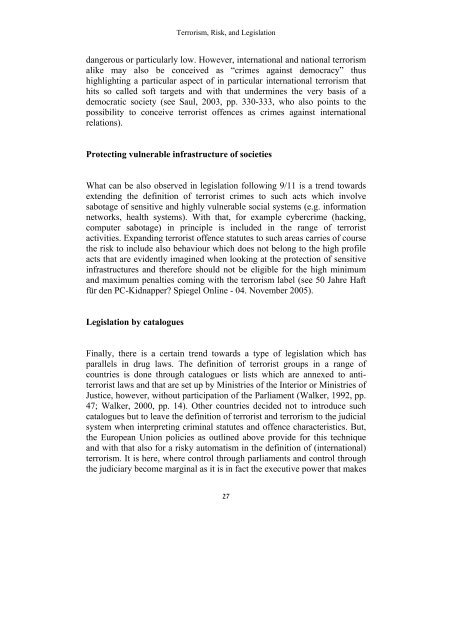222467to222472
222467to222472
222467to222472
Create successful ePaper yourself
Turn your PDF publications into a flip-book with our unique Google optimized e-Paper software.
Terrorism, Risk, and Legislation<br />
dangerous or particularly low. However, international and national terrorism<br />
alike may also be conceived as “crimes against democracy” thus<br />
highlighting a particular aspect of in particular international terrorism that<br />
hits so called soft targets and with that undermines the very basis of a<br />
democratic society (see Saul, 2003, pp. 330-333, who also points to the<br />
possibility to conceive terrorist offences as crimes against international<br />
relations).<br />
Protecting vulnerable infrastructure of societies<br />
What can be also observed in legislation following 9/11 is a trend towards<br />
extending the definition of terrorist crimes to such acts which involve<br />
sabotage of sensitive and highly vulnerable social systems (e.g. information<br />
networks, health systems). With that, for example cybercrime (hacking,<br />
computer sabotage) in principle is included in the range of terrorist<br />
activities. Expanding terrorist offence statutes to such areas carries of course<br />
the risk to include also behaviour which does not belong to the high profile<br />
acts that are evidently imagined when looking at the protection of sensitive<br />
infrastructures and therefore should not be eligible for the high minimum<br />
and maximum penalties coming with the terrorism label (see 50 Jahre Haft<br />
für den PC-Kidnapper Spiegel Online - 04. November 2005).<br />
Legislation by catalogues<br />
Finally, there is a certain trend towards a type of legislation which has<br />
parallels in drug laws. The definition of terrorist groups in a range of<br />
countries is done through catalogues or lists which are annexed to antiterrorist<br />
laws and that are set up by Ministries of the Interior or Ministries of<br />
Justice, however, without participation of the Parliament (Walker, 1992, pp.<br />
47; Walker, 2000, pp. 14). Other countries decided not to introduce such<br />
catalogues but to leave the definition of terrorist and terrorism to the judicial<br />
system when interpreting criminal statutes and offence characteristics. But,<br />
the European Union policies as outlined above provide for this technique<br />
and with that also for a risky automatism in the definition of (international)<br />
terrorism. It is here, where control through parliaments and control through<br />
the judiciary become marginal as it is in fact the executive power that makes<br />
27


